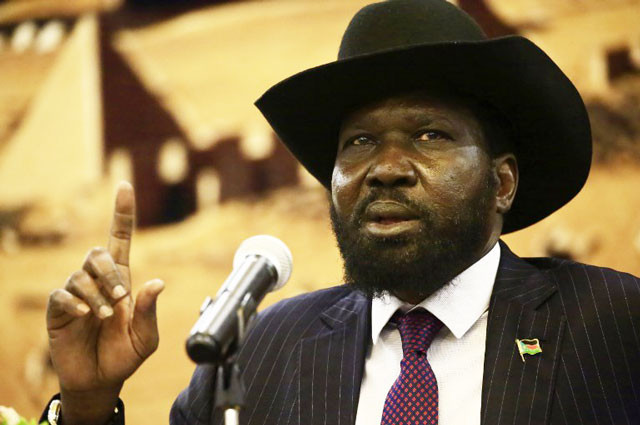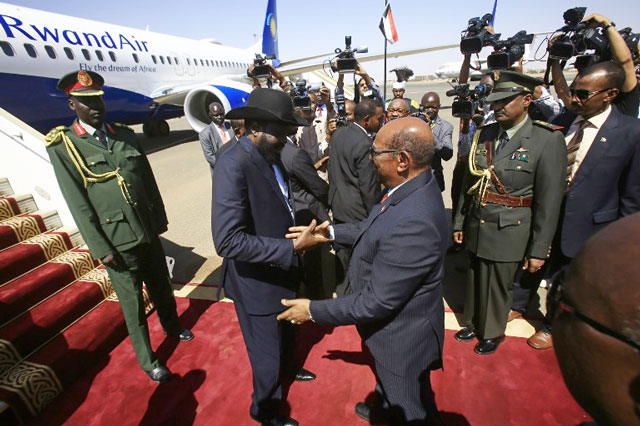
Khartoum, Sudan | AFP | South Sudanese President Salva Kiir on Thursday accused Sudan of being a “source of weapons” fuelling the brutal civil war in his country as he met leader Omar al-Bashir in Khartoum.
“If there is someone who can accuse the other, it is me who can accuse Sudan,” Kiir said at a joint press conference with the Sudanese president.
“Sudan now is the source of weapons that are going to South Sudan and creating problems for us.”
Kiir’s accusation came on the second day of his two-day visit to Khartoum aimed at resolving thorny issues with Sudan, including mutual allegations of supporting rebels in each other’s countries.
Due to the disputes, ties between Khartoum and Juba have often been tense since South Sudan gained independence in 2011.
Juba has accused Khartoum of aiding Kiir’s opponent and former deputy Riek Machar in South Sudan’s ongoing civil war, which has killed tens of thousands and uprooted millions since 2013.
Sudan has regularly accused its neighbour of supporting rebels in its war-torn Darfur, Blue Nile and South Kordofan regions.
Kiir On Thursday reiterated accusations that Khartoum aided Machar, who is currently living in exile in South Africa, and fighters loyal to him.
“Those people of Machar who fled from South Sudan have come here. I can give their names right now,” said Kiir.
It is Kiir’s third visit to Khartoum since the Christian-majority south split from the Muslim north in 2011 after a 22-year civil war that killed hundreds of thousands.

Due to unresolved issues, ties between Khartoum and Juba have often been tense since South Sudan gained independence six years ago.
Border rows, economic issues such as Juba’s payments for the use of an oil export pipeline through Sudan and building a buffer zone along the frontier were expected to dominate talks during Kiir’s visit.
– Tense ties —
Sudan has regularly accused its neighbour of aiding rebels in its war-torn Darfur, Blue Nile and South Kordofan regions, while Juba has accused Khartoum of aiding Kiir’s opponent and former deputy Riek Machar in South Sudan’s ongoing civil war.
The status of the contested border district of Abyei also remains an unresolved issue.
“This visit (of Kiir) is aimed at normalising the relations between the two countries which have been tense,” South Sudanese Information Minister Michael Makuei told reporters minutes after Kiir arrived in Khartoum a day earlier, adding the two leaders would decide on a roadmap to boost trading links.
“The two countries should cooperate in the interests of their people as they are all one people in two countries.”
His Sudanese counterpart Ahmed Bilal said the visit aims to “establish security and stability in the two countries”.
Tens of thousands of people have been killed in South Sudan and millions more have been driven from their homes since the war erupted in the world’s youngest country in December 2013.
More than 450,000 South Sudanese refugees have poured into Sudan since the war broke out, the United Nations says. Khartoum estimates they number 1.3 million.
Juba said it appreciates Khartoum’s efforts to accept the growing number of refugees.
Apart from accepting refugees, the openings of border crossings by Khartoum has also helped trading activities, Juba said in a statement issued before Kiir left for Sudan.
“South Sudan will do all it can to ensure that the Republic of Sudan interests in South Sudan are protected and promoted,” it said.
Several senior South Sudanese officials have regularly visited Khartoum while Kiir himself previously visited in 2015.
 The Independent Uganda: You get the Truth we Pay the Price
The Independent Uganda: You get the Truth we Pay the Price





